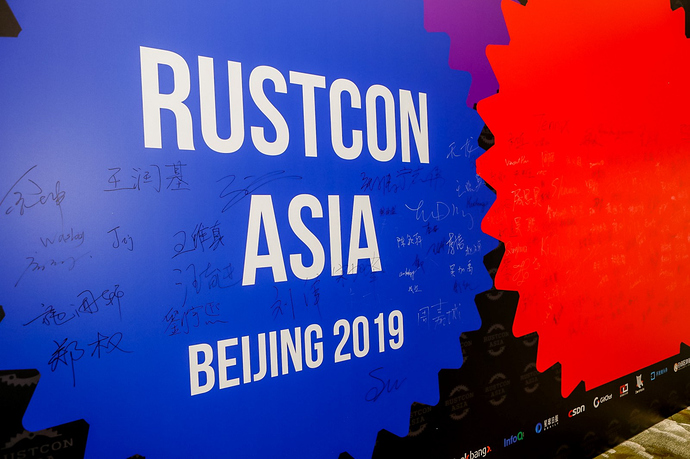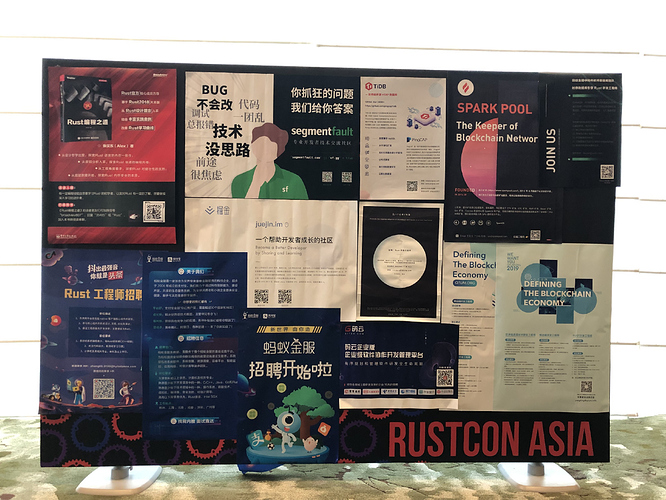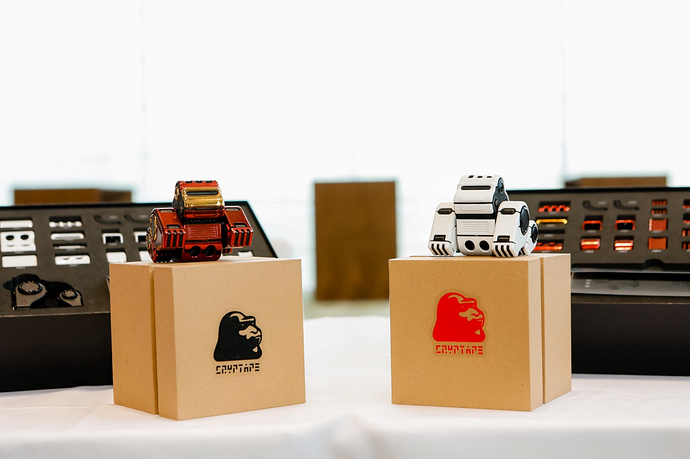Notes from the Organizer
A huge thanks to our attending dev community, presenters, organizing team, sponsors, enthusiasts, volunteers and other stakeholders for coming together for a phenomenal community gathering!
First things first, video of all sessions, will be posted on Rust YouTube channel as soon as our post production team can finish them. Presentation slides, from those presenters who wish to make them available, can be found at #RustCon Asia 【Slides Updates】. There are currently 14 decks from talks and 9 from workshops. Updates will be made as more decks come in.
Photos are also ready here.
It was with pleasure that I was able to take part in the planning and execution of this conference on behalf of Cryptape. There had been a great deal of curiosity about things happening in the Asian/Chinese Rust community.
As an active Rust community member company, Cryptape considered this a great opportunity to bridge, however slightly, the gap currently existing between the Eastern and Western worlds. It had also allowed me to engage with our fellow Rust development community more than any other way could.
It was a bit nerve-wracking to try and meet the expectation of our community, especially because it was the first gathering in this region. When we finally opened the event, everyone felt the time, effort and work to plan such an event was worth it.
About RustCon Asia 2019:
There was definitely a little bit of everything for everyone attended. It was heartwarming to see people enjoying their experience from talks and at the same time meeting new and old friends. The portion of the attendees was just beginning with Rust benefited from talks such as Olivia’s RustBridge for beginners, Nick’s thinking in Rust and Alex’s How to learn Rust efficiently.
RustCon Asia had 27 speakers in total for talks and workshops. They came from different countries around the world and brought topics they were experienced with and shared with us all.
The opening remarks from Cryptape, PingCAP, and Baidu X-Lab were followed by Nick Cameron from Rust core team started the first welcoming talk “Making Rust Delightful.”
For the rest of the first day, we had a series of Rust in-depth talks: Linux from Scratch, competitive programming, implementing secp256k1 and p2p network libraries, Futures, Cargo, Distributed Actor System, stackful coroutine based Rust async story, how to write a custom derive, how to think about systems and more.
On the first half of the 2nd day, there were Rust in production talks, with production experience sharing and use cases in Bilibili, Aliyun, and Zhihu. Many were impressed by the number and quality of Rust projects in Asia. To conclude, Nick as the “housekeeper” gave a closing talk on Rust projects and community update on the whole.
Despite how young the Rust language is, we are already seeing the formation of a community so unique and valuable even to the greater open-source ecosystem. A curated R&D-centric program to enable developers to come together in real-time, face-to-face at least once a year is arguably one of the best ways to serve the community.
The Rust conference experience naturally embodied a kind of cohesiveness in spite of a realm that typically communicates virtually/remotely and asynchronously. In any case, the energy and excitement at the conference are not quite tangible unless one is physically present.
We connected with new friends out of China as well as old friends from Rust online community or other developer communities. Developers paired together to attend workshops for the next 2 days and had an excellent experience from spending time with speakers. Hands-on workshops were IoT, WebAssembly usage, Rust FFI, microservice interface service, security service, RESP parser, etc. And some workshops about learning mindset such as RustBridge and Thinking in Rust.
There were blockchain workshops from Cryptape, Blockstack, and Parity. Speakers shared their project progress and their experience of how to implement blockchain in Rust, which brought us confidence in blockchain technology and the future of the Internet.
We were proud to see many great local projects such as search engine in Zhihu, security in Baidu X-Lab, image web server in Aliyun, live streaming service in Bilibili, database in PingCAP and blockchain framework as well as p2p network framework in Cryptape. These projects use Rust in production.
Event Highlights:
Brian Anderson came to the conference. He talked to many attendees and found everybody was super excited to be part of it. He reemphasized to us that this first Rust conference went “just too well”.
Bhuztez had disappeared online since RubyConf China 2017. When he finally showed up as a speaker to the developers who have known him and were looking forward to his presentation, his particularly fun style had
nobody disappointed.
A shout out to Jiang Jun, who as a Beijing local, compiled a long list of food recommendation during RustCon Asia (RustCon Asia 期间的北京特色餐饮推荐). Make sure you utilize this list for your next visit to Beijing. Wayslog sponsored 9 Rust badges, and Liu Qi donated two Rust hoodies to the conference. We gave them away during Q&A and a wechat lucky draw.
Initially, we didn’t offer live streaming. Finally, on the last day of the workshop, attendees did it on their own. So we ended up having three links for each room. Everything turned out fine.
On Preparation and the Execution side:
There was of course much room for improvement and even the best event could be better. Ana, for instance, joked about how “computers never worked” and we couldn’t have coffee breaks but only breaks. These were, unfortunately, due to a lack of human resource and budget constraint which would certainly improve for the years to come.
Another area we devoted a lot of energy to is the choosing of real-time translators. To make the experience as seamless as possible, we selected only those who had experience in real-time technical translation. We shared some Rust development documentation and some of the slides with the two translators in order to work out the details of interpretation. For example, Future in Rust is not the future we talk in daily life. Developers were surprised at the quality of translation in the end, which made us much relaxed. We have to admit that it was a challenge for the translator because they needed to understand a little bit Rust definition, Mathematics, operation systems as well as a developer’s terminology.
It is no secret that Rust developers are in demand and recruitment offered a challenge. To help address this need, we offered a space for advertisement. Attendees could bring their A1 or A2 size posters here. And it worked very well.
Conference accepted Bitcoin and ETH as payment, even though nobody uses it because nobody wants to spend it out at the current low fiat price I guess. But if you would like to support the next Rust conference in Asia, the two addresses are still available for you, either for donation or ticket payment.
We introduced speakers in advance with bios by digging their Twitter, GitHub, blog and even Instagram for better connection to the speakers (RustCon Asia 讲师介绍全集!(共 27 位)). Anyone is welcome to add to it.
Acknowledgment:
Many thanks go out to all the teams and individuals involved in the planning and execution in no particular order: the tech committees for RustCon Asia consisting of Yiming, Nick, Ana, Luo Chao, Zhiwei Ning and Daniel Lv. They worked together on topics selection that brought us all the great knowledge and excellent speakers.
Florian from Berlin helped with running the CFP app, which opened the opportunities to the whole world and brought potential speakers from a much wider range. Antonio from RustFest Rome helped with lots of details about our first Global conference that crosses the western and eastern culture.
All speakers were quite patient on the stage when we had equipment problems. We felt sorry for not making it smooth, and we will definitely make sure the equipment gets thoroughly checked. Thanks to all those developers in Rust community who spread words for the event in different ways, Twitter, weekly newsletters, wechat moments, telegram and wechat groups and so on.
The organizing team from Cryptape and PingCAP did tons of communication and logistic works, which absolutely cannot be ignored. Organizing a conference is never easy, and teams from the two companies made it happen.
It was definitely a great honor to have Baidu X-Lab as a sponsor, along with Qtum, SNZ Holding, Ferrous System, and Mozilla.
Finally and most importantly, it is the attending community that cares about Rust R&D that is absolutely part and parcel of the positive, constructive and high energy this conference brings together. Our event is a testimony to this amazing community of people, which has been growing, evolving and gathering more momentum as time goes by.
What to do next
With 4-day worth of video footage to be edited, our post production team is busy with editing and suffering with English subtitles. Please be patient.
Immediately after saying goodbye to each other, attendees were already discussing in which city to organize RustCon Asia 2020. We are so looking forward to the conference next year! See you all soon!
Thanks to Toya B for editing and review!
Originally published on Medium: https://medium.com/@Aimeedeer/a-close-touch-with-rust-community-4a8507b756d9


